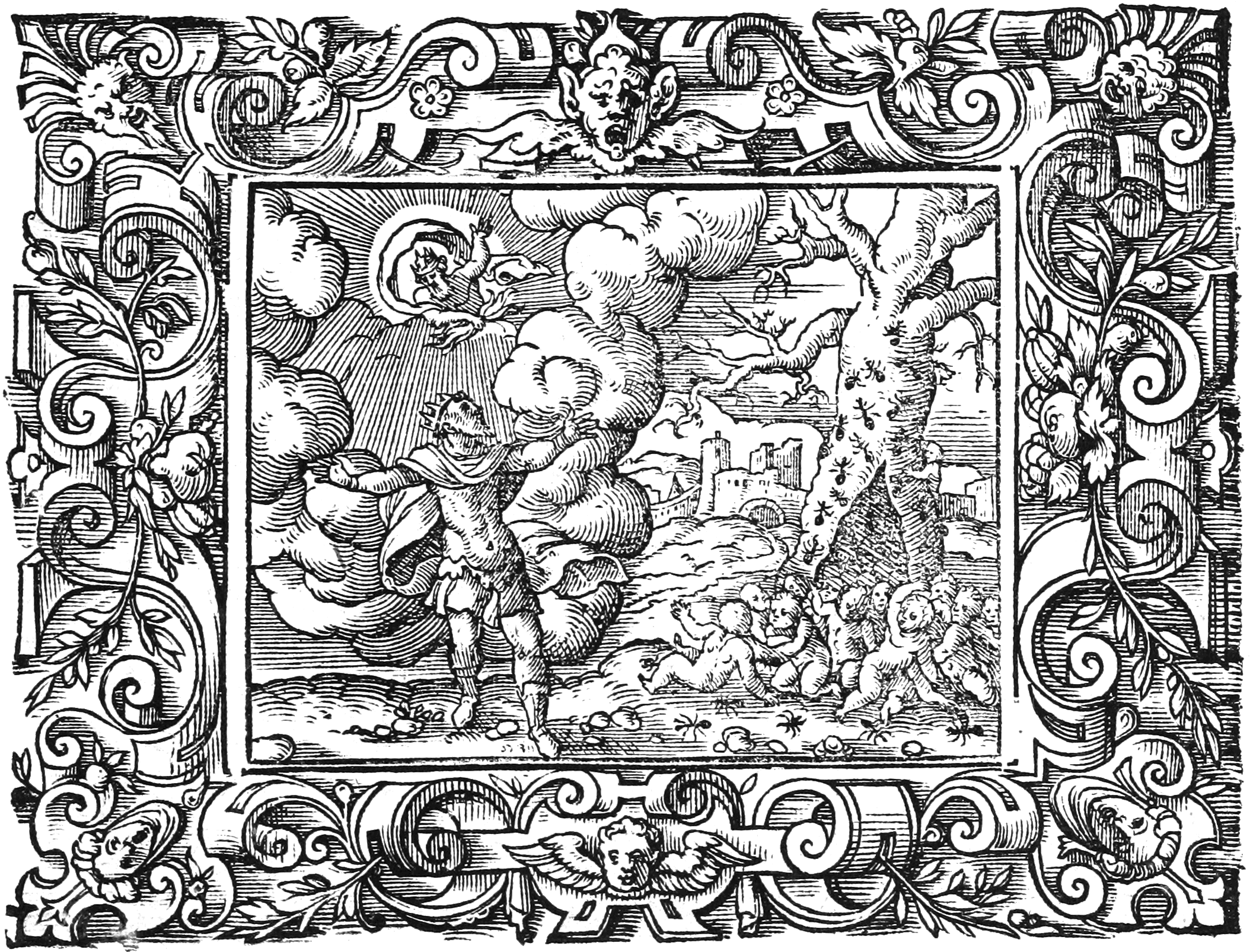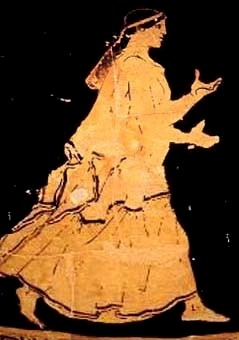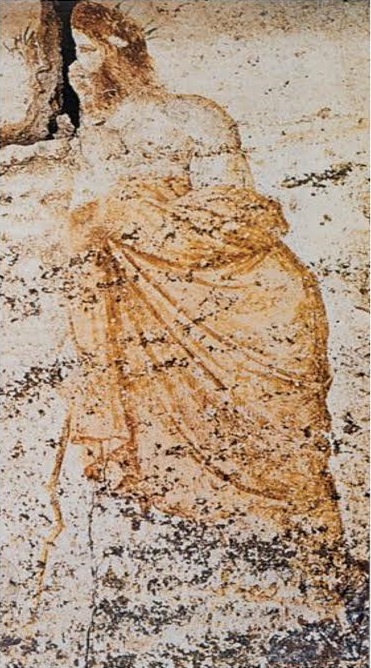|
Aeacus
Aeacus (; also spelled Eacus; Ancient Greek: Αἰακός) was a mythological king of the island of Aegina in the Saronic Gulf. He was a son of Zeus and the nymph Aegina, and the father of the heroes Peleus and Telamon. According to legend, he was famous for his justice, and after he died he became one of the three judges in Hades alongside Minos and Rhadamanthos. In another story, he assisted Poseidon and Apollo in building the walls of Troy. He had sanctuaries in Athens and Aegina, and the Aeginetan festival of the Aeacea (Αἰάκεια) was celebrated in his honour. Family Aeacus was the son of Zeus by Aegina, a daughter of the river-god Asopus, and thus, brother of Damocrateia. In some accounts, his mother was Europa and thus possible brother to Minos, Rhadamanthus and Sarpedon. He was the father of Peleus, Telamon and Phocus and was the grandfather of the Trojan war warriors Achilles and Telemonian Ajax. In some accounts, Aeacus had a daughter called Alcima ... [...More Info...] [...Related Items...] OR: [Wikipedia] [Google] [Baidu] |
Psamathe (Nereid)
In Greek mythology, Psamathe ( grc, Ψαμάθη) is a Nereid, one of the fifty daughters of the sea god Nereus and the Oceanid Doris. By Aeacus, the king of Aegina, she is the mother of a son, Phocus. When Phocus is killed by his half-brothers Peleus and Telamon, Psamathe sends a giant wolf at Peleus' herd. Family Psamathe is one of the fifty Nereids, daughters of Nereus and Doris. By Aeacus, the king of Aegina, she is the mother of a son, Phocus. She is later the wife of Proteus, king of Egypt, by whom she has a son, Theoclymenos, and a daughter, Eido (later known as Theonoe). Mythology There are two myths which involve Psamathe. The first is the story of her violation by Aeacus. Upon his advances, she transforms herself into a seal in an attempt to escape. She is unsuccessful, however, and from their union is born Phocus, whose name (''phoke'' meaning "seal") recalls his mother's metamorphosis. Peleus and Telamon are the sons of Aeacus by his wife Endeis. The two of ... [...More Info...] [...Related Items...] OR: [Wikipedia] [Google] [Baidu] |
Aegina
Aegina (; el, Αίγινα, ''Aígina'' ; grc, Αἴγῑνα) is one of the Saronic Islands of Greece in the Saronic Gulf, from Athens. Tradition derives the name from Aegina, the mother of the hero Aeacus, who was born on the island and became its king. Administration Municipality The municipality of Aegina consists of the island of Aegina and a few offshore islets. It is part of the Islands regional unit, Attica region. The municipality is subdivided into the following five communities (population in 2011 in parentheses ): * Kypseli (2124) * Mesagros (1361) * Perdika (823) * Vathy (1495) The regional capital is the town of Aegina, situated at the northwestern end of the island. Due to its proximity to Athens, it is a popular vacation place during the summer months, with quite a few Athenians owning second houses on the island. Province The province of Aegina ( el, Επαρχία Αίγινας) was one of the provinces of Greece, provinces of the Attica Prefectur ... [...More Info...] [...Related Items...] OR: [Wikipedia] [Google] [Baidu] |
Aegina (mythology)
Aegina (; grc, Αἴγινα) was a figure of Greek mythology, the nymph of the island that bears her name, Aegina, lying in the Saronic Gulf between Attica and the Peloponnesos. The archaic Temple of Aphaea, the "Invisible Goddess", on the island was later subsumed by the cult of Athena. ''Aphaia'' (Ἀφαῖα) may be read as an attribute of Aegina that provides an epithet, or as a doublet of the goddess. Family Though the name ''Aegina'' betokens a goat-nymph, such as was Cretan Amalthea, she was given a mainland identity as the daughter of the river-god Asopus and the nymph Metope; of their twelve or twenty daughters, many were ravished by Apollo or Zeus. Aegina bore at least two children: Menoetius by Actor, and Aeacus by Zeus, both of whom became kings. A certain Damocrateia, who married Menoetius, was also called her daughter by Zeus. The mortal son Menoetius was king of Opus, and was counted among the Argonauts. His son was Patroclus, Achilles' first cousin ... [...More Info...] [...Related Items...] OR: [Wikipedia] [Google] [Baidu] |
Pindar
Pindar (; grc-gre, Πίνδαρος , ; la, Pindarus; ) was an Ancient Greek lyric poet from Thebes. Of the canonical nine lyric poets of ancient Greece, his work is the best preserved. Quintilian wrote, "Of the nine lyric poets, Pindar is by far the greatest, in virtue of his inspired magnificence, the beauty of his thoughts and figures, the rich exuberance of his language and matter, and his rolling flood of eloquence, characteristics which, as Horace rightly held, make him inimitable." His poems can also, however, seem difficult and even peculiar. The Athenian comic playwright Eupolis once remarked that they "are already reduced to silence by the disinclination of the multitude for elegant learning". Some scholars in the modern age also found his poetry perplexing, at least until the 1896 discovery of some poems by his rival Bacchylides; comparisons of their work showed that many of Pindar's idiosyncrasies are typical of archaic genres rather than of only the poet hi ... [...More Info...] [...Related Items...] OR: [Wikipedia] [Google] [Baidu] |
Phocus Of Aegina
In Greek mythology, Phocus (; Ancient Greek: Φῶκος means "seal"), was a prince of Aegina and son of Aeacus and Psamathe. Mythology Phocus' mother Psamathe, the Nereid goddess of sand beaches, transformed herself into a seal when she was ambushed by Aeacus, and was raped as a seal; conceived in the rape, Phocus' name means "seal". Apollodorus, 3.12.6 According to Pindar, Psamathe gave birth to Phocus on the seashore. By Asteria or Asterodia, Phocus had twin sons, Crisus and Panopeus. Aeacus favored Phocus over Peleus and Telamon, his two sons with Endeïs. The '' Bibliotheca'' characterizes Phocus as a strong athlete, whose athletic ability caused his half-brothers to grow jealous. Their jealousy drove them to murder him during sport practice; Telamon, the stronger half-brother, threw a discus at Phocus' head, killing him. The brothers hid the corpse in a thicket, but Aeacus discovered the body and punished Peleus and Telamon by exiling them from Aegina. Telamon was ... [...More Info...] [...Related Items...] OR: [Wikipedia] [Google] [Baidu] |
Minos
In Greek mythology, Minos (; grc-gre, Μίνως, ) was a King of Crete, son of Zeus and Europa. Every nine years, he made King Aegeus pick seven young boys and seven young girls to be sent to Daedalus's creation, the labyrinth, to be eaten by the Minotaur. After his death, Minos became a judge of the dead in the underworld. The Minoan civilization of Crete was named after him by the archaeologist Sir Arthur Evans. Etymology "Minos" is often interpreted as the Cretan word for "king", or, by a euhemerist interpretation, the name of a particular king that was subsequently used as a title. According to La Marle's reading of Linear A, which has been heavily criticised as arbitrary, we should read ''mwi-nu ro-ja'' (Minos the king) on a Linear A tablet. La Marle suggests that the name'' mwi-nu'' (Minos) is expected to mean 'ascetic' as Sanskrit ''muni'', and fits this explanation to the legend about Minos sometimes living in caves on Crete. The royal title ''ro-ja'' is rea ... [...More Info...] [...Related Items...] OR: [Wikipedia] [Google] [Baidu] |
Endeïs
In Greek mythology, Queen Endeïs (; Ancient Greek: Ενδηίς or Ενδαΐς) was the wife of King Aeacus and mother of the heroes Telamon and Peleus (since Peleus was the father of Achilles, Endeïs was Achilles's grandmother). The name is a dialect variant of Engaios (''Ἐγγαῖος'', "in the earth"). Family Endeïs was either the daughter of Chiron and the nymph Chariclo; the daughter of Pandion of Athens; or the daughter of the Megarian warlord Sciron. In some versions, Endeïs's father, Sciron, married her to Aeacus after he declared Sciron the military leader of Megara. Mythology Endeïs hated her stepson Phocus, Aeacus's son by the Nereid Psamathe, and wished he were dead. It is also thought that Telamon and Peleus were jealous of Phocus because he excelled at athletic sports. In either case they drew lots and Telamon was chosen to murder Phocus, his half brother. This was done in a ruse at the pentathlon which they convinced Phocus to participate in. In the ... [...More Info...] [...Related Items...] OR: [Wikipedia] [Google] [Baidu] |
Apollo
Apollo, grc, Ἀπόλλωνος, Apóllōnos, label=genitive , ; , grc-dor, Ἀπέλλων, Apéllōn, ; grc, Ἀπείλων, Apeílōn, label=Arcadocypriot Greek, ; grc-aeo, Ἄπλουν, Áploun, la, Apollō, la, Apollinis, label=genitive, , ; , is one of the Olympian deities in classical Greek and Roman religion and Greek and Roman mythology. The national divinity of the Greeks, Apollo has been recognized as a god of archery, music and dance, truth and prophecy, healing and diseases, the Sun and light, poetry, and more. One of the most important and complex of the Greek gods, he is the son of Zeus and Leto, and the twin brother of Artemis, goddess of the hunt. Seen as the most beautiful god and the ideal of the '' kouros'' (ephebe, or a beardless, athletic youth), Apollo is considered to be the most Greek of all the gods. Apollo is known in Greek-influenced Etruscan mythology as ''Apulu''. As the patron deity of Delphi (''Apollo Pythios''), Apollo is an ... [...More Info...] [...Related Items...] OR: [Wikipedia] [Google] [Baidu] |
Zeus
Zeus or , , ; grc, Δῐός, ''Diós'', label= genitive Boeotian Aeolic and Laconian grc-dor, Δεύς, Deús ; grc, Δέος, ''Déos'', label= genitive el, Δίας, ''Días'' () is the sky and thunder god in ancient Greek religion, who rules as king of the gods on Mount Olympus. His name is cognate with the first element of his Roman equivalent Jupiter.''Larousse Desk Reference Encyclopedia'', The Book People, Haydock, 1995, p. 215. His mythology and powers are similar, though not identical, to those of Indo-European deities such as Jupiter, Perkūnas, Perun, Indra, Dyaus, and Zojz. Entry: "Dyaus" Zeus is the child of Cronus and Rhea, the youngest of his siblings to be born, though sometimes reckoned the eldest as the others required disgorging from Cronus's stomach. In most traditions, he is married to Hera, by whom he is usually said to have fathered Ares, Eileithyia, Hebe, and Hephaestus. At the oracle of Dodona, his consort was said to be ... [...More Info...] [...Related Items...] OR: [Wikipedia] [Google] [Baidu] |
Peleus
In Greek mythology, Peleus (; Ancient Greek: Πηλεύς ''Pēleus'') was a hero, king of Phthia, husband of Thetis and the father of their son Achilles. This myth was already known to the hearers of Homer in the late 8th century BC. Biography Peleus was the son of Aeacus, king of the island of Aegina, and Endeïs, the oread of Mount Pelion in Thessaly. He married the sea-nymph Thetis with whom he fathered Achilles. Peleus and his brother Telamon were friends of Heracles, and served in Heracles' expedition against the Amazons, his war against King Laomedon, and his quest for the Golden Fleece alongside Jason and the Argonauts. Though there were no further kings in Aegina, the kings of Epirus claimed descent from Peleus in the historic period. Mythology Peleus and his brother Telamon killed their half-brother Phocus of Aegina, Phocus, perhaps in a hunting accident and certainly in an unthinking moment, and fled Aegina to escape punishment. In Phthia, Peleus was pur ... [...More Info...] [...Related Items...] OR: [Wikipedia] [Google] [Baidu] |
Rhadamanthos
In Greek mythology, Rhadamanthus () or Rhadamanthys ( grc, Ῥαδάμανθυς) was a wise king of Crete. As the son of Zeus and Europa he was considered a demigod. His name means "showing stern and inflexible judgement". He later became one of the judges of the dead and an important figure in Greek mythology. Family Rhadamanthus was, according to mythology, the son of Zeus and Europa and brother to Sarpedon and Minos (also a king and later a judge of the dead). Together with his brother, Rhadamanthus was raised by Asterion, their stepfather. He had two sons, Gortys (associated with Gortyn, Crete) and Erythrus (founder of Erythrae). Other sources (e.g. Plutarch, ''Theseus'' 20) credit Rhadamanthys rather than Dionysus as the husband of Ariadne, and the father of Oenopion, Staphylus and Thoas. In this account, Ariadne was the daughter of Minos, Rhadamanthys' brother; another Ariadne was the daughter of Minos's grandson and namesake, who features in Theseus's legend and was ... [...More Info...] [...Related Items...] OR: [Wikipedia] [Google] [Baidu] |
Greek Underworld
In mythology, the Greek underworld, or Hades, is a distinct realm (one of the three realms that makes up the cosmos) where an individual goes after death. The earliest idea of afterlife in Greek myth is that, at the moment of death, an individual's essence (''psyche'') is separated from the corpse and is transported to the underworld. In early mythology (e.g., Homer's ''Iliad'' and ''Odyssey'') the dead were indiscriminately grouped together and lead a shadowy post-existence; however, in later mythology (e.g., Platonic philosophy) elements of post-mortem judgment began to emerge with good and bad people being separated (both spatially and with regards to treatment). The underworld itself— commonly referred to as Hades, after its patron god, but also known by various metonyms—is described as being located at the periphery of the earth, either associated with the outer limits of the ocean (i.e., ''Oceanus'', again also a god) or beneath the earth. Darkness and a lack of sunlig ... [...More Info...] [...Related Items...] OR: [Wikipedia] [Google] [Baidu] |






